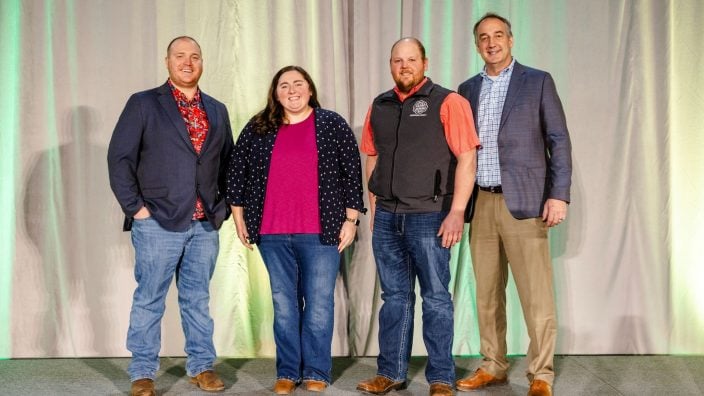Applications for Ohio Farm Bureau Health Plans now available
Members have three ways to apply: contacting a certified agent, calling 833-468-4280 or visiting ohiofarmbureauhealthplans.org.
Read MoreFarming just keeps getting more challenging, so I guess that’s why only 2% of Americans are farmers and ranchers today. That number frightens me and breaks my heart all at the same time.
One thing I struggle with daily is why don’t we celebrate and support our farmers more regularly? Only 2% of our country is feeding the world. That’s absolutely amazing. The United States has the safest and most wholesome food supply in the world. Amazing again. Our farmers and ranchers are doing more with less. Still amazing.
We literally would not survive without farmers, and yet we see farmers facing more and more challenges on a daily basis, with the bulk amount coming from consumer and government imposition.
According to the American Farm Bureau, 2 million farms dot America’s rural landscape. About 98% of farms in the United States are operated by families. But right now, our family farms are in trouble, and we need your help.
Recently, legislation proposed in Congress would tax capital gains at death and eliminate stepped-up basis as a way to raise revenue for government spending. The elimination of stepped-up basis would be devastating to family farms and Ohio agriculture. The effects of this would be felt throughout the country.
Capital gains taxes are taxes on the difference between the price you bought something for and what you sold it for. This applies to properties, stocks and more. A stepped-up basis allows beneficiaries to save on capital gains tax by “stepping up” the value from its original price to the current price or value. This “step up” happens when an asset, like property, is inherited.
The stepped-up basis is a process that allows a farmer to pay capital gains taxes only on a property’s increase in value since the time the land was inherited, instead of paying the full increase in value since it was purchased by a deceased relative. And a landowner would only pay those capital gains taxes if they later sell the property. If a farm is in a family for multiple generations, it is very likely that the land value has increased so much that without a stepped-up basis, the next generation of farmers could be forced to sell the land just to pay the taxes.
To help make things a little more clear, let’s take a look at a scenario. Frank purchased a 500-acre farm in 1955 for $30,000. He passed away in 2012 and left the farm to his son, Ted. At the time of Frank’s death and the property transferring the farm to Ted, the property value was $1 million. Since that land was passed to Ted, the property value gets stepped up. No capital gains taxes are paid.
Ted passed away in 2022 and left the same farm to the third generation, his daughter, Sally. The property is now valued at $3 million. Currently, stepped-up basis would look at that $2 million increase in value from when Ted inherited the farm and no capital gains taxes are paid unless Sally is selling the farm.
However, if stepped-up basis were repealed, Sally must pay capital gains taxes on the $2 million increase in value. Sally is in her last year of college and planned to continue her family’s legacy of providing local foods to her community, but instead would be forced to sell her family’s farm just to pay the taxes.
It is imperative that our congressmen and women support the continued use of stepped-up basis. Proposals to charge capital gains taxes at death and repealing stepped up basis would be devastating to family farms and make farming even more challenging than it already is. Farms are often passed from generation to generation over many years. The value of land likely increased so much that without stepped-up basis, the next generation couldn’t afford to pay the capital gains taxes.
While there is talk of exemptions for farms from these proposals, more details are needed to understand how they would truly affect farm families. Only 2% of farmers are left in America, and funding the government should not come at the expense of the people who feed and clothe the world. They need our support now.
Farm Bureau has Action Alerts out for our members to let their congressmen and women know how important this is to your farm and how taking away stepped-up basis would impact your children and grandchildren as you try to pass your legacy on from generation to generation. If interested in contacting your elected officials but are unsure where to start, call 440-426-2195, the Northeast Counties Farm Bureau office. For information on stepped-up basis and capital gains taxes, visit ohiofarmbureau.org.
Submitted by Mandy Orahood, the OFBF organization director serving Ashtabula, Geauga, Lake and Trumbull County Farm Bureaus. She can be reached by email.
OFBF Mission: Working together for Ohio farmers to advance agriculture and strengthen our communities.


Members have three ways to apply: contacting a certified agent, calling 833-468-4280 or visiting ohiofarmbureauhealthplans.org.
Read More

Ohio Farm Bureau members met one-on-one with state legislators and staff to discuss policy priorities impacting Ohio’s farms and rural communities.
Read More

Legacy nutrient deductions enable new farmland owners to claim deductions on the nutrients within the soil on which healthy crops depend.
Read More

Farmers, agribusinesses and community members are encouraged to nominate their local fire departments for Nationwide’s Nominate Your Fire Department Contest through April 30.
Read More

Introduced by Sen. Paula Hicks-Hudson, SB 120 would establish the Urban Farmer Youth Initiative Pilot Program.
Read More

Gases, vapors, and fumes can all create risk. How can we measure and protect ourselves from them?
Read More

The Ohio Farm Bureau’s Young Agricultural Professionals State Committee has named its 2026 leadership and the individuals who will be serving on the state committee for 2026-2028.
Read More

The Ohio Farm Bureau Foundation has multiple scholarships available to Ohio students from rural, suburban and urban communities who are pursuing degrees with a connection to the agricultural industry.
Read More

With 100% bonus depreciation now permanent, farmers can deduct the full cost of a new agricultural building in the year it’s placed in service.
Read More

Lincoln Deitrick was named the Outstanding Young Farmer, Denver Davis won the Excellence in Agriculture Award, and Margaret Houts won the Discussion Meet.
Read More